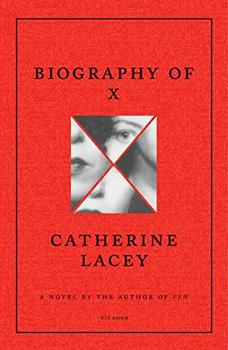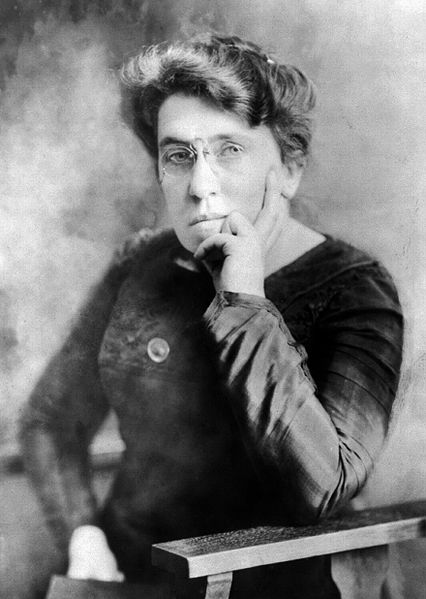Summary | Excerpt | Reading Guide | Reviews | Beyond the Book | Read-Alikes | Genres & Themes | Author Bio

A Novel
by Catherine LaceyThis article relates to Biography of X
 In Biography of X, author Catherine Lacey imagines a world in which Russian-born anarchist and progressive activist Emma Goldman had a legitimate political career in the United States, serving as governor of Illinois and then chief of staff to President Franklin Delano Roosevelt. In this capacity, Goldman ushered in profound systemic change, attaching amendments for same-sex marriage, prison abolition and immigrants' rights to FDR's New Deal, a progressive trifecta that inspired the southern states to secede. Lacey's version of Goldman was assassinated in 1945.
In Biography of X, author Catherine Lacey imagines a world in which Russian-born anarchist and progressive activist Emma Goldman had a legitimate political career in the United States, serving as governor of Illinois and then chief of staff to President Franklin Delano Roosevelt. In this capacity, Goldman ushered in profound systemic change, attaching amendments for same-sex marriage, prison abolition and immigrants' rights to FDR's New Deal, a progressive trifecta that inspired the southern states to secede. Lacey's version of Goldman was assassinated in 1945.
The real-life Goldman was born in 1869 in Konvo, Lithuana, which was then part of the Russian Empire. She moved with her family to St. Petersburg in 1881, where she was exposed to the ideals of Russian revolutionaries. She carried these ideals with her when she emigrated to the United States in 1885, settling in Rochester, New York. She got a job in a garment factory and came to know many pro-labor socialist and anarchist activists among her fellow workers. In 1889, she moved to New York City, where she began her life-long relationship with fellow activist Alexander Berkman. In 1892, Berkman shot Henry Clay Frick, the manager of a Pennsylvania steel plant who employed scabs during a labor dispute and hired guards to protect them, leading to a shootout between the guards and the plant's striking workers. Frick survived the assassination attempt and Berkman was sentenced to 22 years in prison, of which he served 14. As a known associate of Berkman's, Goldman was arrested but later released, as police could not prove she had any connection to the crime.
In the years that followed, Goldman became increasingly well-known for her political writing and speeches. She was a feminist, but critical of the Suffragette movement — as an anarchist, she did not believe liberation could be found in democratic politics. She was charged with inciting a riot during an economic downturn in 1893 after an anti-capitalist speech in New York City's Union Square in which she reportedly told unemployed attendees, "If they do not give you work, demand bread. If they deny you both, take bread." In September 1901, anarchist Leon Czolgosz assassinated President William McKinley and told police that he had been inspired by one of Goldman's speeches. In response, Goldman remarked, "As an anarchist, I am opposed to violence. But if the people want to do away with assassins, they must do away with the conditions which produce murderers." From 1906-1917, she produced the anarchist magazine Mother Earth. Law enforcement targeted its subscribers for investigation, declaring the magazine's contents "treasonable."
Goldman served two years in prison for opposing the draft during World War I. During her stint, Congress passed the 1918 Immigration Act, which targeted foreign-born anarchists and other political radicals for deportation. Upon her release, Goldman, along with Alexander Berkman, was deported to Russia. Through the 1920s and '30s, she wrote scathing critiques of Soviet Communism.
In her later years, Goldman wrote a memoir, Living My Life (1930), and visited Spain during the Spanish Civil War to support the anti-fascists fighting against Francisco Franco. She died in 1940 while living in Canada. She was buried in Chicago, where she had lived around the turn of the century.
Photo portrait of Emma Goldman by T. Kajiwara (1876–1960)
Filed under People, Eras & Events
![]() This "beyond the book article" relates to Biography of X. It originally ran in April 2023 and has been updated for the
March 2024 paperback edition.
Go to magazine.
This "beyond the book article" relates to Biography of X. It originally ran in April 2023 and has been updated for the
March 2024 paperback edition.
Go to magazine.
Your guide toexceptional books
BookBrowse seeks out and recommends the best in contemporary fiction and nonfiction—books that not only engage and entertain but also deepen our understanding of ourselves and the world around us.